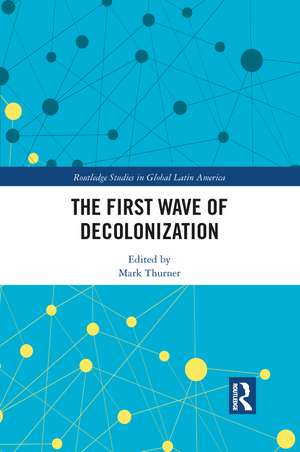The First Wave of Decolonization: Routledge Studies in Global Latin America
Editat de Mark Thurneren Limba Engleză Paperback – 30 iun 2021
Preț: 380.63 lei
Nou
Puncte Express: 571
Preț estimativ în valută:
72.84€ • 75.47$ • 60.79£
72.84€ • 75.47$ • 60.79£
Carte tipărită la comandă
Livrare economică 21 martie-04 aprilie
Preluare comenzi: 021 569.72.76
Specificații
ISBN-13: 9781032092553
ISBN-10: 1032092556
Pagini: 164
Ilustrații: 4 Illustrations, black and white
Dimensiuni: 152 x 229 x 9 mm
Greutate: 0.24 kg
Ediția:1
Editura: Taylor & Francis
Colecția Routledge
Seria Routledge Studies in Global Latin America
Locul publicării:Oxford, United Kingdom
ISBN-10: 1032092556
Pagini: 164
Ilustrații: 4 Illustrations, black and white
Dimensiuni: 152 x 229 x 9 mm
Greutate: 0.24 kg
Ediția:1
Editura: Taylor & Francis
Colecția Routledge
Seria Routledge Studies in Global Latin America
Locul publicării:Oxford, United Kingdom
Public țintă
Postgraduate and UndergraduateCuprins
Foreword. Introduction 1. A Brief Conceptual History of "Colonia" 2. Decolonizing Customs 3. Inventing Columbia/Colombia 4. Race and Revolution in Colombia, Haiti, and the United States 5. Decolonizing Europe 6. Second Slavery and Decolonization in Brazil 7. The Lost Italian Connection
Notă biografică
Mark Thurner is Professor of Latin American Studies at the Institute of Latin American Studies, School of Advanced Study, University of London.
Descriere
This volume is the first to describe and analyze the scope and meanings of the global phenomenon of decolonization during the late 18th and early 19th centuries. It vastly expands the horizons of decolonization, conventionally understood to be a post-war development emanating from Europe.



